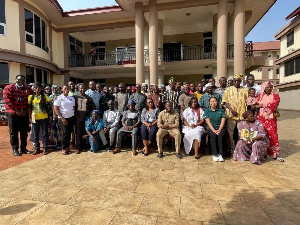



Early Childhood Education in the North East Region has seen massive improvement through the Quality and Inclusive Early Childhood Education Service for All Children (QAIECE) project funded by the Korea International Cooperation Agency (KOICA).
Key project achievements include: 9 fully furnished KG and WASH facilities, 3,865 sets of school supplies, 2 boreholes, training of 54 teachers in the new KG curriculum and Learning Through Play (LTP), provision of 77 LTP manuals, 3,872 calendars, and 77 KG curricula.
Additionally, 120 community facilitators were trained in the LTP methodology, VSLA groups were sensitized on the importance of ECD, 25 health workers were trained on LTP and extended the same to parents during ante/post-natal sessions, 52 radio discussions and airings on ECE were conducted, 26 SISOs were trained on effective supervision, 20 SISOs were supported to effectively monitor schools, and 1 regional and 1 national ECE forum were organized to highlight the need for support to ECE by relevant stakeholders.
The project also conducted an online survey that revealed Northern Ghana is still facing significant challenges at the kindergarten level. The study, part of the project, revealed a worrying lack of qualified teachers in the region.
Of the nine schools assessed, only seven out of forty teachers had qualifications in early childhood education, according to Dr. James Natia Adam, an independent consultant who conducted the end-line evaluation for the QAIECE project.
Speaking at the project’s closeout ceremony in Tamale, Dr. Adam underscored the shortage of trained teachers, particularly in the North East Region.
“During the baseline survey, only two out of twenty-eight qualified teachers were identified. That number increased to five mid-project and reached seven by the end. This highlights a significant gap in early childhood education expertise in the region,” he noted.
Dr. Adam acknowledged improvements in school attendance and parental engagement following the recent infrastructure improvements made by the project funded by KOICA and implemented by Childfund Korea, Children Believe, and AG Care, but warned that the scarcity of qualified teachers could jeopardize the future of early childhood education in the region if care is not taken.
Infrastructure gains but deficit persist
Esenam Kavi De Souza, Country Director of Children Believe, implementers of the QAIECE project, disclosed that nine early childhood learning facilities had been constructed in communities within the North East Region.
Despite this progress, she pointed out that the region faces a severe infrastructure deficit for early childhood education.
“Northern Ghana, in general, has a huge deficit in early childhood education infrastructure. For instance, in the North East Region, where the project was implemented, there was no standard kindergarten facility prior to this initiative.
"The nine facilities we’ve constructed with funding from KOICA in partnership with Childfund Korea and AG Care are currently the only standard ones in the region,” she said.
To ensure sustainability, Ms. De Souza highlighted the formation of community committees to manage and maintain the new facilities.
These committees have been trained to monitor the structures, perform basic repairs, and seek support from local government authorities for major renovations.
Government acknowledges efforts
North East Regional Minister Yidana Zakaria commended KOICA, Childfund Korea, and Children Believe for their contributions to the region’s educational development.
He praised their interventions as a critical complement to the government’s efforts to improve basic education and access to potable water.
“The emergence of KOICA, Childfund Korea, and Children Believe in the North East Region has amplified the needs of children and brought positive change to communities.
"Beyond providing classrooms, they have also drilled boreholes to ensure access to quality drinking water for students,” the Minister stated.
He highlighted two boreholes provided at Zaaran-Tinga L.A. Primary and Walewale Primary B as examples of the tangible impact of these interventions, which he described as invaluable in advancing quality education for Ghanaian children.
As the QAIECE project comes to a close, stakeholders remain hopeful about its lasting impact and the potential for continued advancements in early childhood education throughout Northern Ghana. The good news is that KOICA has approved Phase II of the project, which will run for the next three years, from 2025 to 2028.
This next phase will build on the successes of Phase I and aim to create even greater impacts in the East and West Mamprusi municipalities, further strengthening the educational rights of Ghanaian children.